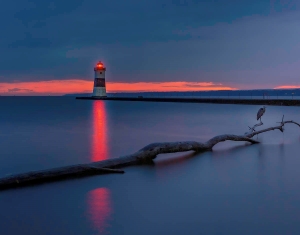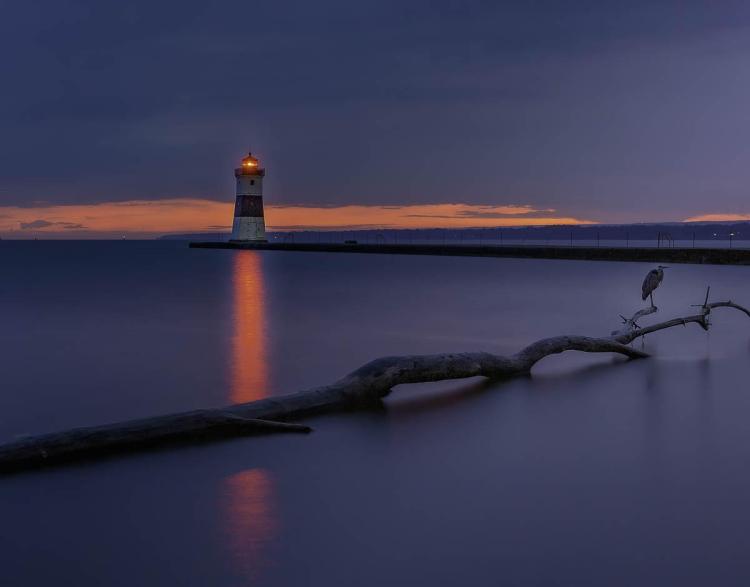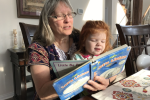Does one really have to fret about enlightenment?
No matter what road I travel, I’m going home.
—Shinso
It was one of those long, weary flights where you're happy for a bit of conversation. "And where are you from?" I asked the woman next to me. "Well, it depends on what you mean," she answered me. "My husband's a German who is working in Saudi Arabia so we'll be there for at least three years. I grew up in Wyoming—I have one sister there yet, but the rest of the family is scattered around the country—and I moved to Chicago right after college for about six years. Then, after we got married, we moved East. So, we have a home there that we hope to come back to someday. But…you never know."
I remembered as she talked that the poet Robert Frost wrote once, "Home is where, when you go there, they have to take you in."
But a place called home is getting harder and harder to define in this world at this time. If most of us did go back where we were born or where we grew up, it wouldn't be there. And if the house itself is still there, more than likely somebody else lives in it, not any of the family that built it.
If we are still where we grew up, most of the people we grew up with are gone. Our teachers, our friends, our neighborhood, the old playground, and teenage hangouts are all gone now, are simply memories of another life. A new world has overgrown them like cement over grass.
The irony is that we have never been so able to communicate as we are now and, at the same time, so far away from the people to whom we're connected.
We are all a basically homeless people now.
We are a world populated by different kinds of homelessness: immigrants driven from their homes by war and poverty; the walking wounded, the mentally ill who wander, talking to themselves, sleeping in bushes as they go; the battered, the lonely, the rootless street people of the country.
And all the while, the rest of us live next door to people from other states and other nations. We work with people who have gone from job to job across the country, the world, all their lives.
We live in a world of people displaced in the name of progress, wiped out of homesteads and farms, old family businesses and once stable industries in the name of “development.”
But that kind of homelessness creates other kinds of psychic homelessness, even in the affluent, often far more difficult to manage than simply not being where we're born all our lives. It's this second kind of homelessness, of being disconnected, of being transient that leaves an emptiness in all of us, even when our lives are full.
The question is, then, is life better now and fuller now that we have all begun to roam our way through life? Or, have we lost the irreplaceable? Has homelessness triumphed? Are we all lost somewhere in the middle of nowhere? And if so, what are we to do about it?
Tuesday, March 1: The truth is that we never really leave “home.” Even though we never go back there, we take something of the place with us wherever we go. “Where we love is home,” Oliver Wendell Holmes, Sr. writes, “home that our feet may leave, but not our hearts.”
Wednesday, March 2: Even if we could go home, most of us would not want to go back to all of it. It’s what our hearts need that we miss, not everything we experienced. “Homecoming,” an unidentified poet wrote, “means coming home to what is in your heart.”
Thursday, March 3: Home is much more about the heart than the body. We can shelter the body—if we are willing. It’s the heart, alone and wandering, that we can’t protect.
Friday, March 4: So much of what we miss, we missed when we had it.
Saturday, March 5: For the homeless among us who have neither house nor family, neither a place to stay now nor a place to go back to, there is only us. The question is, What are we doing about it—on any human level?
Sunday, March 6: Home is what we cannot bear to lose. Money can go, the job can go, even the people can go. But home? Home is where we know we belong. And belongingness is everything in life.
Monday, March 7: In a society that believes in individualism so strongly, the irony is that some individuals are simply not able to take care of themselves.
Tuesday, March 8: “To shelter the homeless” is one of the corporal works of mercy. It’s a painful one because it brings us to face ourselves and the way we intend to go through life. It demands that we ask ourselves who we have failed to shelter. And why not? Because we were too unaware, too busy, too frightened, too blind to even see them on our streets, maybe?
Wednesday, March 9: For most of us, our childhood home is the place where we spend the least amount of time in life but are most affected by for the rest of it. “Home,” John Ed Pearce says, “is a place you grow up wanting to leave and grow old wanting to get back to.” Which means, of course, that we must all be home for everybody else.
Thursday, March 10: To be homeless is to be without security, without dignity, without love. If we are morally obliged to help anyone, it is surely the homeless.
Friday, March 11: To care for the homeless is to make the manger at Bethlehem a moral imperative rather than a Christmas myth.
Saturday, March 12: It is possible to live in a house with someone and be homeless at the same time. As the Irish blessing puts it: “May the roof about us never fall in. And may we good companions beneath it never fall out.”
Sunday, March 13: When women and their children are living in cars because they cannot pay the rent on an apartment because they must use the money they do earn for food, there is something wrong with the rest of society.
Monday, March 14: When the web of human contacts breaks down, society breaks down with it. Keeping in touch with your friends, your associates, your family may be the single most impacting thing we can do to keep humanity human. “Where thou art—that,” Emily Dickinson writes, “is home.”
Tuesday, March 15: Home is where we build the human race. It is there that we bring people together to warm their souls at the hearts of those who love them.
Wednesday, March 16: We are all on our way “home” somewhere. The only question is how long it will take us to realize that. Coming home to our best selves is the best thing that can happen to the world around us.
Thursday, March 17: To have a home of one’s own is to invest in the welfare of the planet. It brings with it the moral responsibility to keep the planet healthy and the rest of its people housed.
Friday, March 18: It is possible to move around the world easily now, but home is not always where we are at the moment. “Home is not where you live,” Christian Morgenstern writes, “but where they understand you.”
Saturday, March 19: To be without a home is not a sign of personal weakness. It is a sign of a world that has become disjointed, become refugee from the kind of humanity that is by nature compassionate, just, and loving.
Sunday, March 20: When the homeless are the mentally ill, the poor, the old, the jobless, the financially bereft—not the roamers and romantics or the reprobate and irresponsible we like to assume they are, it is the rest of us who are under suspicion for being less than human. “People who are homeless,” Sheila McKechnie writes, “are not social inadequates. They are people without homes.”
Monday, March 21: Home is a spiritual as well as a material thing. It is meant to be the place for which we were made and in which we thrive best. “A house is no home,” Benjamin Franklin writes, “unless it contains food and fire for the mind as well as for the body.”
Tuesday, March 22: Simply having a place to live is no substitute for having a place to weep and hurt, to laugh and sing, to be heard and held.
Wednesday, March 23: We can give the homeless shelters—and we must. It is learning how to give them life that is the rest of the enterprise.
Thursday, March 24: We are put on earth to grow into ourselves and beyond ourselves, as well. We have a natural homing instinct for God that must be satisfied or we will never be satisfied under any conditions. As Malcolm Muggeridge says it, “The only ultimate disaster that can befall us is to feel ourselves at home on this earth.”
Friday, March 25: One of the greatest indicators of the spiritual paucity of this society is the fact that with more homeless on the streets of the United States than ever in the history of the nation, we have learned not to see them at all.
Saturday, March 26: The ultimate moral responsibility is to take people into our lives. St. Bernard of Clairvaux says of such a mentality, “We find rest in those we love and we provide a resting place in ourselves for those who love us.”
Sunday, March 27: To fail to be a haven for another human being is to fail to be a human being at all.
Monday, March 28: Who are the homeless today? “The homeless,” write Marjorie Hope and James Young, “are our other selves…. They tell us of the American dream, the belief that anyone who tried hard enough in the competitive struggle could prosper has become an illusion.”
Tuesday, March 29: Home is what enables us to function well in the rest of the world. It is not a home if it is more a prison or a refuge from life. Beware the family that is too turned in on itself.
Wednesday, March 30: What Jesus left us in Bethlehem is a responsibility to welcome those who come to our neighborhoods, our schools, our country seeking safety, seeking security, seeking life. Otherwise, what is this thing called “Christian?”
Thursday, March 31: And then there’s the writer who said it all when s/he wrote: “Thank God for dirty dishes; they have a tale to tell. While other folk go hungry, we’re eating pretty well. With home and health and happiness, we shouldn’t want to fuss, for by this stack of evidence, God’s very good to us.”
Let’s Share Our Thoughts
The following discussion questions, Scripture echoes, Journal prompts, and prayer are meant to help you reflect more deeply on The Monastic Way. Choose at least two suggestions and respond to them. You may do it as a personal practice or gather a group interested in sharing the spiritual journey. Once a month The Monastic Way staff will convene a Zoom conference where you can share your insights. Three times a year Sister Joan Chittister will join that Zoom conference to give more input and respond to your questions and ideas regarding one issue of The Monastic Way.
Discussion Questions
1. What places or situations or people are home for you? How do you know? In what ways do you protect, shelter, create home for others?
2. Which daily quote in The Monastic Way is most meaningful to you? Why? Do you agree with it? Disagree? Did it inspire you? Challenge you? Raise questions for you?
3. After reading The Monastic Way, write one question that you would like to ask the author about this month’s topic.
4. Joan Chittister uses other literature to reinforce and expand her writing. Find another quote, poem, story, song, art piece, novel that echoes the theme of this month’s Monastic Way.
5. Sister Joan intersperses the daily reflections with reminders of the hordes of homeless in our midst—the poor, the refugees, the mentally ill.... She asks, “What are you doing about it—on any human level?” How would you answer?
Scripture Echo
The rain came down, the streams rose, and the winds blew and beat against that house; yet it did not fall, because it had its foundation on the rock.
—Matthew 7:25
What does it mean to say that a home is built upon a rock? What “materials,” what “qualities” might you put into the foundation of your home so that it could withstand the storms of life?
Journal Prompts
Prompt 1. Here are a few statements from this month’s Monastic Way. Choose one that is most helpful to you and journal with it:
•Home is much more about the heart than the body.
•We have a natural homing instinct for God that must be satisfied.
•To shelter the homeless is one of the corporal works of mercy.
 Prompt 2. Spend a few minutes with this photograph and journal about its relationship to this month’s Monastic Way. You can do that with prose or a poem or a song or...
Prompt 2. Spend a few minutes with this photograph and journal about its relationship to this month’s Monastic Way. You can do that with prose or a poem or a song or...
Prayer
You have made us for yourself, O God,
and our hearts are restless
until they rest in You.
—Saint Augustine
JOAN CHITTISTER is an internationally known author and lecturer and a clear visionary voice across all religions. She has written more than 60 books and received numerous awards for her writings and work on behalf of peace and women in the church and in society.
KAREN BUKOWSKI, an Erie native, is a nature photographer and former LPGA and PGA Golf Professional who holds a master’s degree in public administration. Visit karenbukowskiphotography.com to find many nature and landscape photographs.

 Artwork: by Karen Bukowski
Artwork: by Karen Bukowski




